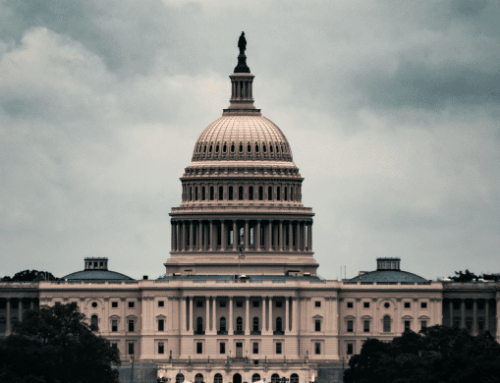September 12, 2023
The Honorable Mike Rogers
Chairman, House Armed Services Committee
2469 Rayburn House Office Building
Washington, DC 20515
The Honorable Adam Smith
Ranking Member, House Armed Services Committee
2264 Rayburn House Office Building
Washington, DC 20515
The Honorable Jack Reed
Chairman, Senate Armed Services Committee
Hart Senate Office Building, Room 728
Washington, D.C. 20510
The Honorable Roger Wicker
Ranking Member, Senate Armed Services Committee
Russell Senate Office Building, Room 425
Washington, D.C. 20510
Dear Chairmen Rogers and Reed and Ranking Members Smith and Wicker,
As a nonpartisan budget watchdog organization, Taxpayers for Common Sense (TCS) has long advocated for responsible national security spending and policy. In this letter, rather than discuss long-standing issues of our concern regarding prevented retirement of legacy systems and added unrequested programs and projects, we write to share our deep concern about the long-term financial implications of some climate change related provisions included in both the House and Senate versions of the Fiscal Year 2024 National Defense Authorization Act.
Successive Secretaries of Defense have indicated that the national security threats from climate change are real, yet provisions included in both the Senate and House versions of the NDAA would shield military contractors from emissions reporting requirements and documenting supply change risks, a shortsighted approach that may ultimately cost taxpayers more in the long run as we grapple with the escalating impacts of climate change.
The provisions in the NDAA are as follows:
- Section 1822 of H.R.2670[1] – This provision seeks to prohibit the implementation of the proposed FAR climate rule. It prevents authorized funds from supporting greenhouse gas (GHG) inventorying or the setting of science-based emissions reduction targets for any DOD contractors. This limitation is fundamentally misguided, ignoring the critical relationship between climate change and national security, hindering the ability of the DOD to set emission targets and track progress, and threatening both environmental sustainability and responsible fiscal stewardship. Furthermore, the provision denies DOD from understanding supply chain risk of their contractors due to climate change, endangering successful execution of their mission and putting men and women in uniform at risk.
- Section 820 of S.2226[2] – This provision aims to constrain the proposed federal rule’s effectiveness by restricting the DOD’s ability to require reporting of GHG emissions from nontraditional defense contractors. In FY22, nontraditional defense contracts accounted for $100 billion in defense spending. The two-year moratorium added to this provision seems a strategic move to delay federal enforcement until a future Congress and Administration. This short-term maneuvering disregards the essence of transparency and undermines our ability to address climate change effectively.
It is incumbent upon federal agencies to limit taxpayers’ liability for climate change through rulemakings and other actions aimed at curtailing sources of GHG emissions that are known to accelerate climate change and its associated costs. Increasing transparency and awareness of how industries, particularly major government contractors, are affected by climate-related risks is a positive and necessary step toward improving public understanding of the costs and risks of climate change.
Better understanding of these costs and drivers will aid in reducing future taxpayer expenses to combat and adapt to climate change. TCS has extensively reported on the financial burdens imposed on federal taxpayers by the increasing frequency and severity of climate-related events, including the impact of intense storms, and we emphasize the historical and projected costs associated with federal disaster response.
Disclosures such as those in the Federal Acquisition Regulation (FAR): “Disclosure of Greenhouse Gas Emissions and Climate-Related Financial Risk,” (87 Fed. Reg. 68312)[3] would advance the public, policymakers, and watchdog organizations’ ability to track companies’ contributions to climate change. This exposure will help protect taxpayers from the financial burden created by polluting industries. Moreover, requiring science-based emission reduction targets for major government suppliers will create markets and incentives for GHG-reducing investment and innovation.
As the world’s largest purchaser of products and services, with $630 billion of procurements in 2021, the federal government has significant influence over private investment and innovation. Promoting the development of better, cheaper commercial technology to reduce GHG emissions and their associated costs for taxpayers should be a priority of federal policy. This kind of market development through procurement policy could achieve comparable results with less spending.
TCS believes that fiscal responsibility and environmental stewardship are not mutually exclusive; rather, they go hand in hand. We call on our lawmakers to recognize that these provisions are shortsighted and risk setting a precedent that jeopardizes our national security, financial stability, and environmental responsibility.
As you conference the two bills, we urge to consider the broader picture, consider the long-term interests of taxpayers, and reject these misguided provisions in the final agreed upon FY24 National Defense Authorization Act.
[1] H.R.2670 – National Defense Authorization Act for Fiscal Year 2024
[2] S.2226 – National Defense Authorization Act for Fiscal Year 2024
[3] Federal Register: Federal Acquisition Regulation: Disclosure of Greenhouse Gas Emissions and Climate-Related Financial Risk
Sincerely,
Steve Ellis
President










